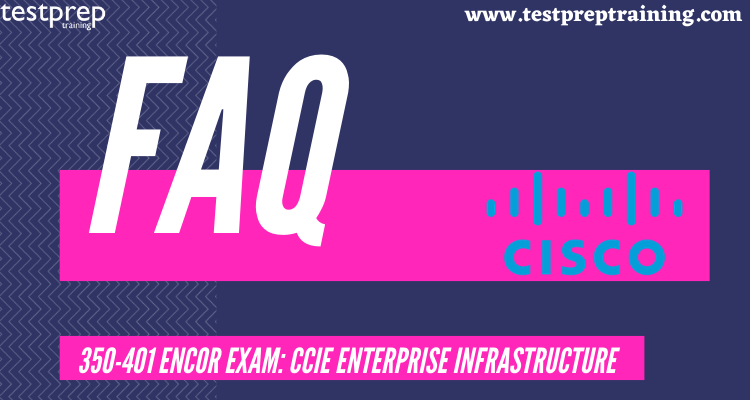350-401 ENCOR Exam: CCIE Enterprise Infrastructure
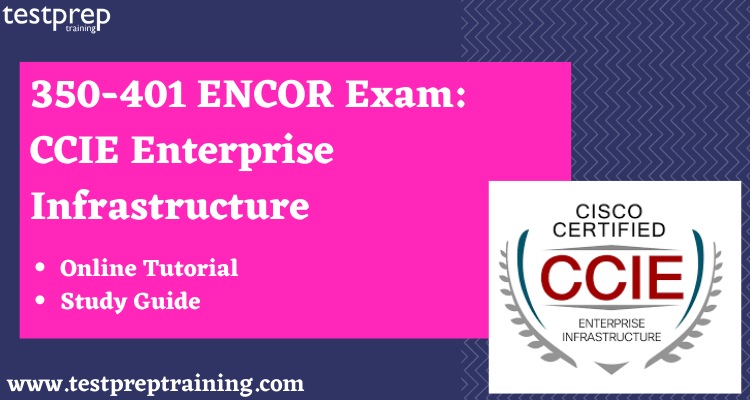
The 350-401 ENCOR (Implementing Cisco Enterprise Network Core Technologies) exam is a certification exam for the CCNP Enterprise and CCIE Enterprise Infrastructure certifications. The exam measures a candidate’s knowledge and skills in implementing and managing enterprise-level network infrastructure.
The purpose of the CCIE Enterprise Infrastructure tutorial is to provide candidates with a comprehensive overview of the topics covered in the 350-401 ENCOR exam. The tutorial aims to help candidates prepare for the exam by providing them with a detailed understanding of the exam topics, including advanced layer 2 and layer 3 technologies, data center technologies, WAN technologies, network virtualization, network automation, network assurance, security for wired and wireless networks, and VPN technologies.
Target Audience:
- The target audience for the CCIE Enterprise Infrastructure tutorial and the 350-401 ENCOR exam includes network professionals who are seeking to advance their careers in enterprise-level network infrastructure design, deployment, and management.
- The tutorial and exam are aimed at professionals who have experience in implementing network solutions and want to expand their knowledge and skills in advanced networking technologies, virtualization, automation, and security.
- The certification is ideal for network architects, engineers, and administrators who are responsible for designing, deploying, and managing enterprise-level network infrastructure solutions.
- Candidates who are pursuing the CCIE Enterprise Infrastructure certification are typically senior-level network professionals with extensive experience in enterprise networking solutions.
Skills and Knowledge Required
To take the 350-401 ENCOR exam, candidates must have a good understanding of network fundamentals, including routing, switching, wireless, and security concepts. Additionally, candidates should have a minimum of three to five years of experience in implementing enterprise-level network solutions.
Candidates should also have a good understanding of Cisco’s enterprise networking architecture and solutions. Candidates who are preparing for the CCIE Enterprise Infrastructure certification should have a minimum of five to seven years of experience in designing, deploying, and managing complex enterprise network infrastructure solutions.
Learning Path
- Cisco provides a variety of certifications in a variety of industries. Cisco offers a variety of certificates, including entry, associate, specialised, professional, expert, and architect.
- Many certifications were included in each level. CCIE Enterprise Infrastructure certification validates your ability to work with complicated enterprise infrastructure solutions.
- You must pass two exams to earn the CCIE Enterprise Infrastructure certification: a qualifying exam that covers core enterprise infrastructure technologies and a hands-on lab exam that covers enterprise networks throughout their entire lifecycle, from design to deployment to operation and optimization.
- Step 1: Take the qualifying exam
- Step 2: Take the lab exam
Exam Details
- The 350-401 ENCOR Exam: CCIE Enterprise Infrastructure exam have to be answered in 120 minutes.
- The cost of taking this exam is $400, although, the prices may vary from place to place.
- Next, the 350-401 ENCOR Exam is available in the English and Japanese languages.
- Lastly, the passing score for the exam is variable & changes every time. On average it is 750-850/1000. And, you can schedule the exam at Pearson VUE platform. there are no prerequisites for the exam.
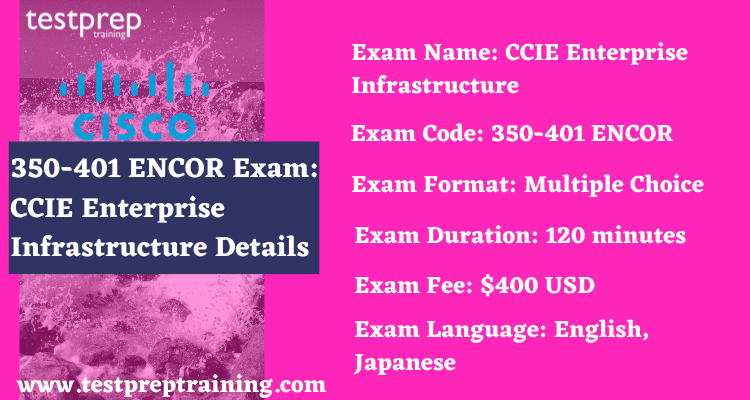
350-401 ENCOR Exam Glossary
Here is a glossary of terms related to the 350-401 ENCOR exam:
- LAN (Local Area Network): A network that connects devices within a limited geographic area, such as an office building or campus.
- WAN (Wide Area Network): A network that connects devices over a large geographic area, such as multiple cities or countries.
- MAN (Metropolitan Area Network): A network that connects devices within a metropolitan area, such as a city or town.
- Spine-Leaf Network Design: A network architecture in which leaf switches are connected to spine switches, providing high-bandwidth connectivity between devices.
- SD-Access (Software-Defined Access): A Cisco technology that provides policy-based network automation and segmentation for wired and wireless networks.
- SD-WAN (Software-Defined Wide Area Network): A network architecture that uses software to manage and optimize the performance of a wide area network.
- Virtual Machine (VM): A virtualized version of a physical computer that can run its own operating system and applications.
- Hypervisor: Software that allows multiple virtual machines to run on a single physical machine.
- Network Function Virtualization (NFV): The practice of replacing traditional network hardware with software-based virtualized functions.
- Campus LAN: A local area network that connects devices within a single building or group of buildings.
- Data Center Networking: The practice of connecting servers, storage devices, and other data center equipment to a network.
- IoT (Internet of Things) Network: A network of devices that are connected to the internet and can communicate with each other.
- Access Control List (ACL): A set of rules that determines which network traffic is allowed or denied based on specific criteria.
- Firewall: A network security device that monitors and controls incoming and outgoing network traffic.
- Network Address Translation (NAT): A technique used to remap one IP address space into another by modifying network address information in the IP header of packets while they are in transit across a traffic routing device.
- Virtual Private Network (VPN): A secure connection between two networks over the internet.
- Secure Sockets Layer (SSL): A protocol used to secure communication over the internet.
- Intrusion Detection System (IDS): A system that monitors network traffic for signs of unauthorized access or other security threats.
- Intrusion Prevention System (IPS): A system that actively monitors network traffic and takes action to prevent security threats.
- Network Programmability: The practice of using software to automate network configuration and management tasks.
Scheduling the Exam
To schedule your exam, follow the steps given below:
- Log into your account at Pearson VUE.
- Select Proctored Exams and enter the exam number, 350-401 ENCOR.
- Follow the prompts to register.
350-401 ENCOR Course Outline
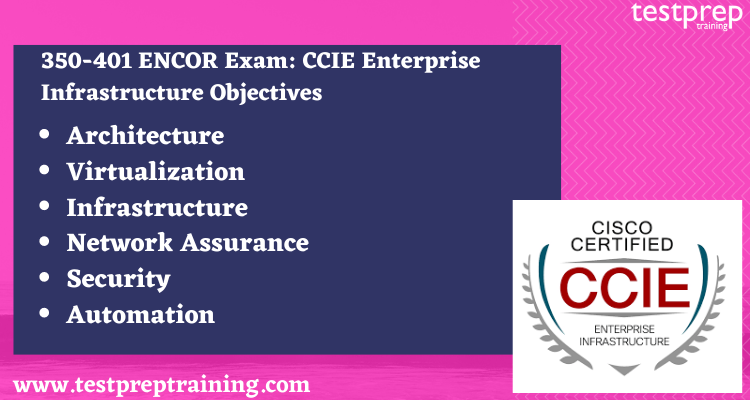
Domain 1: Architecture
1.1 Explain the different design principles used in an enterprise network
- Enterprise network design such as Tier 2, Tier 3, and Fabric Capacity planning (Cisco Reference: Enterprise Campus 3.0 Architecture)
- High availability techniques such as redundancy, FHRP, and SSO (Cisco Reference: High Availability (SSO) Deployment Guide, First Hop Redundancy Protocol (FHRP))
1.2 Analyze design principles of a WLAN deployment
- Wireless deployment models (centralized, distributed, controller-less, controller-based, cloud, remote branch) (Cisco Reference: Enterprise Mobility 8.1 Design Guide)
- Location services in a WLAN design (Cisco Reference: Wi-Fi Location-Based Services)
1.3 Differentiate between on-premises and cloud infrastructure deployments (Cisco Reference: To Cloud or Not to Cloud)
1.4 Explain the working principles of the Cisco SD-WAN solution
- SD-WAN control and data planes elements (Cisco Reference: Cisco SD-WAN Design Guide)
- Traditional WAN and SD-WAN solutions (Cisco Reference: Traditional WAN)
1.5 Explain the working principles of the Cisco SD-Access solution
- SD-Access control and data planes elements (Cisco Reference: Cisco SD-Access Solution Design Guide, Software-Defined Access 1.0)
- Traditional campus interoperating with SD-Access(Cisco Reference: Cisco SD-Access Solution Design Guide)
1.6 Describe concepts of wired and wireless QoS
- QoS components (Cisco Reference: QoS Features and Components)
- QoS policy (Cisco Reference: Applying QoS Policies, Quality of Service (QoS) Configuration Guide)
1.7 Differentiate hardware and software switching mechanisms
- Process and CEF (Cisco Reference: Understanding Cisco Express Forwarding (CEF), CEF Overview)
- MAC address table and TCAM
- FIB vs. RIB (Cisco Reference: RIB and FIB tables)
Domain 2: Virtualization
2.1 Describe device virtualization technologies
- Hypervisor type 1 and 2
- Virtual machine (Cisco Reference: Virtual Machine)
- Virtual switching
2.2 Configure and verify data path virtualization technologies
- VRF (Cisco Reference: Virtual Route Forwarding Design Guide)
- GRE and IPsec tunneling (Cisco Reference: Point-to-Point GRE over IPsec Design Guide)
2.3 Describe network virtualization concepts
- LISP (Cisco Reference: Locator ID Separation Protocol (LISP) Overview)
- VXLAN (Cisco Reference: Configure VXLAN)
Domain 3: Infrastructure
3.1 Layer 2
- Troubleshoot static and dynamic 802.1q trunking protocols
- Troubleshoot static and dynamic EtherChannels (Cisco Reference: Configuring EtherChannels, Static and dynamic Ether-channel)
- Configure and verify common Spanning Tree Protocols (RSTP and MST) (Cisco Reference: Spanning Tree Protocols (STP, MST)
3.2 Layer 3
- Compare routing concepts of EIGRP and OSPF (advanced distance vector vs. linked state, load balancing, path selection, path operations, metrics)
- Configure and verify simple OSPF environments, including multiple normal areas, summarization, and filtering (neighbor adjacency, point-to-point, and broadcast network types, and passive-interface) (Cisco Reference: Configuring OSPF)
- Configure and verify eBGP between directly connected neighbors (best path selection algorithm and neighbor relationships) (Cisco Reference: Sample Configuration for iBGP and eBGP)
3.3 Wireless
- Describe Layer 1 concepts, such as RF power, RSSI, SNR, interference noise, band and channels, and wireless client device capabilities
- Describe AP modes and antenna types (Cisco Reference: Antenna Fundamentals)
- Describing access point discovery and join process (discovery algorithms, WLC selection process)
- Describe the main principles and use cases for Layer 2 and Layer 3 roaming (Cisco Reference: Enterprise Mobility 4.1 Design Guide)
- Troubleshoot WLAN configuration and wireless client connectivity issues
3.4 IP Services
- Describe Network Time Protocol (NTP) (Cisco Reference: Network Time Protocol)
- Configure and verify NAT/PAT (Cisco Reference: Verifying NAT and PAT Configuration)
- Configure first hop redundancy protocols, such as HSRP and VRRP (Cisco Reference: First Hop Redundancy Protocols Configuration Guide)
- Describe multicast protocols, such as PIM and IGMP v2/v3 (Cisco Reference: IP Multicast Technology Overview)
Domain 4: Network Assurance
4.1 Diagnose network problems using tools such as debugs, conditional debugs, trace route, ping, SNMP, and syslog (Cisco Reference: Troubleshooting and Fault Management, Troubleshooting Tools)
4.2 Configure and verify device monitoring using syslog for remote logging
4.3 Configure and verify NetFlow and Flexible NetFlow (Cisco Reference: Configuring Flexible NetFlow)
4.4 Configure and verify SPAN/RSPAN/ERSPAN (Cisco Reference: Understanding SPAN,RSPAN,and ERSPAN)
4.5 Configure and verify IPSLA (Cisco Reference: Configuring IP SLA)
4.6 Describe Cisco DNA Center workflows to apply network configuration, monitoring, and management (Cisco Reference: Workflow Overview)
4.7 Configure and verify NETCONF and RESTCONF (Cisco Reference: Configure NETCONF)
Domain 5: Security
5.1 Configure and verify device access control
- Lines and password protection
- Authentication and authorization using AAA (Cisco Reference: Authentication Authorization and Accounting Configuration Guide, Configuring AAA)
5.2 Configure and verify infrastructure security features
- ACLs
- CoPP (Cisco Reference: Control Plane Policing Implementation Best Practices)
5.3 Describe REST API security
5.4 Configure and verify wireless security features
- EAP (Cisco Reference: Configure EAP-TLS Authentication with ISE)
- WebAuth
- PSK
5.5 Describe the components of network security design
- Threat defense
- Endpoint security (Cisco Reference: Cisco Next-Generation Endpoint Security)
- Next-generation firewall (Cisco Reference: Cisco Firewalls)
- TrustSec, MACsec (Cisco Reference: Configuring Cisco TrustSec MACSec)
- Network access control with 802.1X, MAB, and WebAuth (Cisco Reference: 802.1X Authentication Services Configuration Guide)
Domain 6: Automation
6.1 Interpret basic Python components and scripts
6.2 Construct valid JSON encoded file (Cisco Reference: Create JSON Document Step)
6.3 Describe the high-level principles and benefits of a data modeling language, such as YANG (Cisco Reference: YANG Data Modeling and NETCONF, Configure NETCONF/YANG)
6.4 Describe APIs for Cisco DNA Center and vManage (Cisco Reference: Cisco DNA Center Platform Overview)
6.5 Interpret REST API response codes and results in payload using Cisco DNA Center and RESTCONF
6.6 Construct EEM applet to automate configuration, troubleshooting, or data collection (Cisco Reference: Cisco EEM Basic Overview
6.7 Compare agent vs. agentless orchestration tools, such as Chef, Puppet, Ansible, and SaltStack
Exam Policies
Becoming completely aware of the exam policies should be your first action when you think of preparing for this exam. You should be completely aware of the terms and conditions of the vendor before taking the exam so you don’t feel that you missed out on any important details post the exam. You can visit the official site for knowing the exam policies better.
Exam Retake Policy
The policies for retaking exams are as follows:
- Candidates who fail an Associate, Professional, Specialist, or CCDE Written exam must wait five (5) calendar days to retry for the same exam, starting the day after the failed attempt.
- After passing an exam, a candidate must wait at least 180 days before taking another exam with the same number.
- Candidates who fail an Online / Un-Proctored Cisco (700-xxx series) exam must wait forty-eight hours (48 hours) before retaking the exam.
Scoring policy
The score for this exam varies every time as they depend on the statistical analysis. Although, the average score observed during the past years was around 750-850 on the scale of 100 – 1000. As the score is variable, so, CISCO does not publish its score for the exam because they are subject to change without any information. At the completion of the exam, candidates receive a score report along with a score breakout by exam section and the passing score for the given exam.
Recertification
Certification status will expire after a period of time so, CISCO has its recertification policy. Candidates with a valid certification must pass an exam designated for recertification to keep their status and reminders will be sent via your email address.
For more details, visit: 350-401 ENCOR Exam: CCIE Enterprise Infrastructure FAQ
Preparation Steps for 350-401 ENCOR Exam
The preparation steps which are essential in order to successfully pass the 350-401 ENCOR Exam: CCIE Enterprise Infrastructure are:
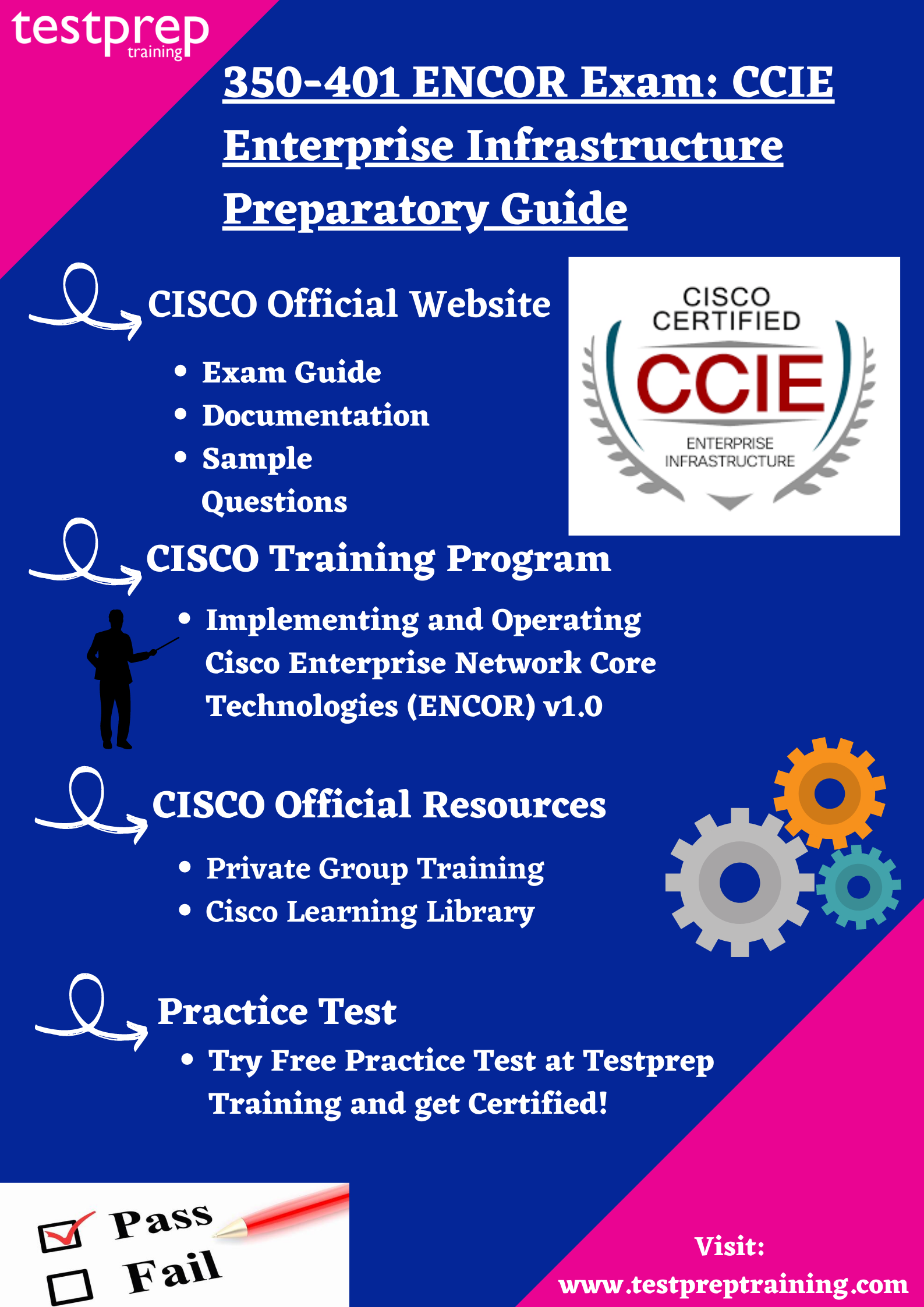
1. CISCO Official Website
Visiting the CISCO official website is an important step while preparing for the 350-401 ENCOR Exam: CCIE Enterprise Infrastructure. The official site has a wealth of reliable information and resources that may be used to prepare for the exam. Study guides, sample papers, whitepapers, documentation, faqs, and other resources are available. All of this information is available on the official page for the contender.
2. CISCO Training Program
Training programs are a very necessary step in the preparation of such exams as 350-401 ENCOR Exam: CCIE Enterprise Infrastructure. CISCO offers its own training programs on its various examinations and certifications. For the 350-401 ENCOR Exam, it offers:
Implementing and Operating Cisco Enterprise Network Core Technologies (ENCOR) v1.0
This course will help you:
- Configure, troubleshoot, and manage enterprise wired and wireless networks
- Implement security principles within an enterprise network
- Prepare to take the 350-401 Implementing Cisco Enterprise Network Core Technologies (ENCOR) exam
3. Private Group Training
CISCO provides Private Group Training for its exams. They deliver any Cisco course in this format, from certification classes to the latest technology and business transformation training. And they can tailor any curriculum to the unique needs of your organization. Private group training is a convenient, cost-effective choice for groups with many people who all need the same training. They do the traveling so you don’t have to.
4. Cisco Learning Library
Cisco provides a Learning Library to help candidates to gain foundational knowledge and skills for all network needs. But, this new library includes the Cisco Platinum Learning Library and Cisco Technical Knowledge Library for a great price. For all of your network needs, the Cisco Learning Library provides core knowledge and rapid reference solutions. Technical insights, design guides, best practices, and webinars are all available in the Cisco Technical Knowledge Library.
5. Books and Guides
Books and study guides should be the following stage in the preparation process. The aspirant must seek for books that are full of useful knowledge. Finding a decent book may be tough, but the candidate must discover, read, and comprehend in order to gain information and abilities. The following are some suggestions:
- CCNP Enterprise Certification Study Guide: Implementing and Operating Cisco Enterprise Network Core Technologies: Exam 350-401 by Ben Piper
- Automation: CCNP and CCIE ENCOR 350-401 V1.0 Core Exam Guide Series by Muhammad Afaq Khan
6. Join a Study Group
Participating in a group study will also benefit the candidate. It will motivate them to put in more effort. Additionally, studying in a group will allow them to maintain contact with others who are on the same route as them. Furthermore, the conversation in such study groups will assist students in passing their tests.
7. Practice Test
Most importantly, candidates must take their practice tests in person. Practice tests are the ones that ensure the candidate’s readiness. The Practice tests will assist applicants in identifying their weak points so that they can address them. Nowadays, the candidate can choose from a variety of practice examinations available on the internet.
Final Words
The 350-401 ENCOR exam is a challenging exam that requires extensive knowledge and experience in enterprise-level network infrastructure solutions. However, with the right study strategies and resources, candidates can effectively prepare for the exam and pass with confidence.
After passing the 350-401 ENCOR exam, candidates can pursue the CCNP Enterprise and CCIE Enterprise Infrastructure certifications. Candidates can also continue to expand their knowledge and skills in advanced networking technologies and pursue other Cisco certifications.


